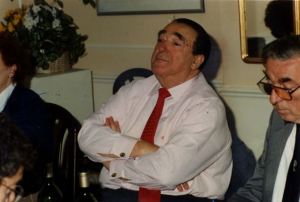Robert Maxwell (1923-1991) was a Czechoslovakian-born media proprietor and UK Member of Parliament. He was the publisher of a wide range of newspapers, including the Daily Mirror, Sunday Mirror, The People, Daily Record and the New York Daily News, but he will always be remembered as the man who stole hundreds of millions of Pounds (£458m to be exact) from his employee’s pension fund in order to prop up his failing companies and indeed a life of unprecedented luxury.
I’ve just finished reading ‘Maxwell: The Final Verdict’, a brilliantly researched book about the life of Robert Maxwell, written by one of the greatest writers of the modern era, Tom Bower. The book goes into incredible detail about how Maxwell, allegedly supported by his son Kevin, convinced his own directors, senior management, lawyers and bankers that what he was doing with pension fund money was acceptable.
Without going into all the details, he was basically borrowing money from (mostly) unsuspecting banks using shares belonging to the pension funds as collateral. As that source of funds started to dry up he implemented one of the most embarrassingly deceitful, but simple, forms of financial fraud by entering into foreign exchange contracts with banks to buy Dollars with Sterling but then ‘forgetting’ to pay over the Sterling (after having received the Dollars).
But, leaving aside the fascinating insight into the way in which the fraud was perpetrated, the book highlights a number of interesting features about Maxwell’s life.
The first is the fact that he had no friends, which is probably not surprising for a man with few redeeming features. The monstrous ego of the man comes across strongly, typified by his getting his hair dyed black every few days by his personal stylist. In fact, it was to this stylist that he admitted one evening to having no friends and that “people only like me for my money, and I’m including my family in that.” Immediately after he died reporters noted that not one member of his family was seen shedding a tear, not least his wife who he had treated with the utmost disrespect. (He left her 60th birthday party after an hour and before the speeches.)
Another characteristic of the man was his staggering sense of self-entitlement. At the time of his death, the ‘bankrupt’ Maxwell owed 2 private jets, a helicopter, a 180 foot luxury yacht (the Lady Ghislaine) and was living in Headington Hill Hall, a period house in the Oxford countryside. Maxwell was the sole passenger on his luxury yacht, paid for by his employee’s pensions, when he died.
Robert Maxwell didn’t fall overboard, contrary to the findings of the inexperienced Spanish coroner. With the banks hours away from collapsing his empire, he jumped. He wasn’t just the epitome of a glutton – he was the epitome of a coward.
Conor Foley

